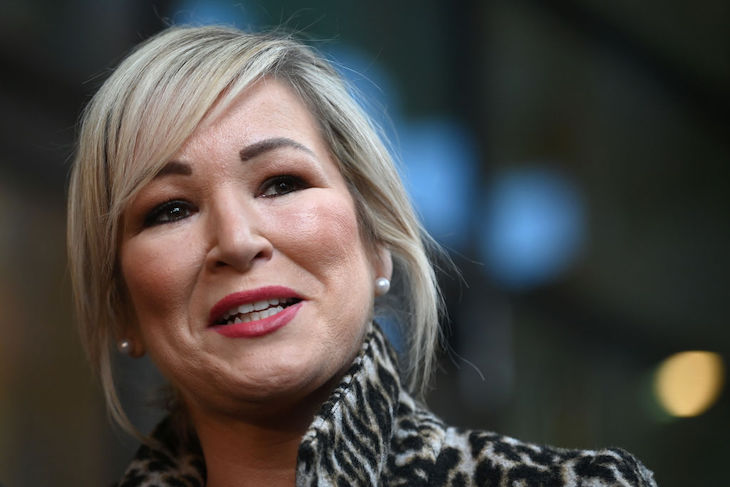The appointment of a new executive by the Northern Ireland Assembly on Saturday was a hugely significant moment. There was no government at Stormont for exactly two years from 3 February 2022 until Michelle O’Neill of Sinn Féin accepted the assembly’s nomination to be first minister at the weekend. She is the first Republican leader of Northern Ireland since the state was created in May 1921, what its inaugural prime minister, Sir James Craig, would describe as ‘a Protestant parliament and a Protestant state’. This was history being made live on television.
For the national and international media, I suspect this will be the end of the story which began with the refusal of the Democratic Unionist Party to participate in the assembly after the 2022 election, at which Sinn Féin had made history by winning most seats. But that is not the story, that is the prologue. For the people of Northern Ireland, the real narrative begins now.
The oldest people born after 1998’s Belfast/Good Friday Agreement have been eligible to vote in assembly elections twice, in March 2017 and May 2022. But in the seven years since they could first cast their ballots, there was a functioning government for only two years, between the New Decade, New Approach agreement in January 2020 and Paul Givan’s resignation as first minister over the terms of the Northern Ireland Protocol in February 2022. That is not a record of which any of Northern Ireland’s politicians should be proud.
That is not a record of which any of Northern Ireland’s politicians should be proud.
The Belfast/Good Friday Agreement was sold in extravagant terms. There is no doubt that it was historic and transformative, and in a strange way it delivered some of the most optimistic expectations at the same time as the darkest fears were realised. It has brought about a kind of peace that was unknown before 1998: that year there were 55 deaths related to the Troubles, while in 1999 it dropped to eight, and there would never again be a sustained terrorist campaign of the sort which had marked the 1970s and 1980s.
If the very real sacrifices were to be justified, however, the agreement had to offer the generations born after its signing a new kind of politics, a fundamental kind of normality, in which voters were concerned about the economy, education, healthcare and infrastructure. This chimes with the nature of younger voters, who are less likely than their parents and grandparents to be religious and less likely to identify as Unionist or Nationalist, or to regard that as the foundation of their political identity.
More than a quarter of Northern Ireland’s population was born after the Belfast/Good Friday Agreement. They face a challenging landscape: economic growth is sluggish and predicted to remain so; in investment terms, Northern Ireland is in the middle of the UK pack, performing better than Scotland or Wales but lagging behind the South and South East of England; and public services, robbed of leadership and decision-making for two years, are struggling, especially in terms of pay.
In order to take on these challenges, the new executive has to create new traditions in a country larded with them. One which would be the greatest legacy of all would be the fostering of a tradition of boring political normality.
O’Neill and Emma Little-Pengelly, the DUP deputy first minister with whom she must act jointly, can no longer rely on Whitehall for financial solutions. The deal with the DUP agreed with Chris Heaton-Harris, the Northern Ireland secretary, includes a payment of £3.3 billion, of which around £600 million is to address the worst problems of public sector pay, but there are also conditions.
Ninety per cent of Northern Ireland’s public spending comes in a block grant from the Treasury. The executive now has to commit to raising additional revenue through its own mechanisms, but more widely it has to find a new economic model that reduces unaccountable dependence on the block grant and draws on the particular conditions of Northern Ireland. While the taxable capacity of Northern Ireland is relatively low in UK terms, it has a thriving tourism industry, a rapidly expanding tech sector and access to the European single market. But there is a large public sector – a quarter of the economy – and although healthcare spending per capita is similar to Great Britain, the outcomes are much worse.
O’Neill and Little-Pengelly are intelligent people. They know where Northern Ireland is weak, but the more intangible question is this: do they get it? Do they understand that the new generations of voters will not be satisfied with furious references to Article 6 of the Act of Union, or hard-faced avowals that there was no alternative to the armed struggle?
The new executive does not have very much time. Two years of this assembly mandate have gone already: voters return to the polls in May 2027, 105 years to the month after the last British soldiers left the south of Ireland. The leaders of the parties in the executive must be able to go to voters to commend what they have done, not for their communities, but for the community of Northern Ireland. Is the economy performing better? Are schools improving? Are waiting lists shorter?
If they can’t do this, the generation born after the Belfast/Good Friday Agreement will be entitled to wonder what the point of it all was.







Comments